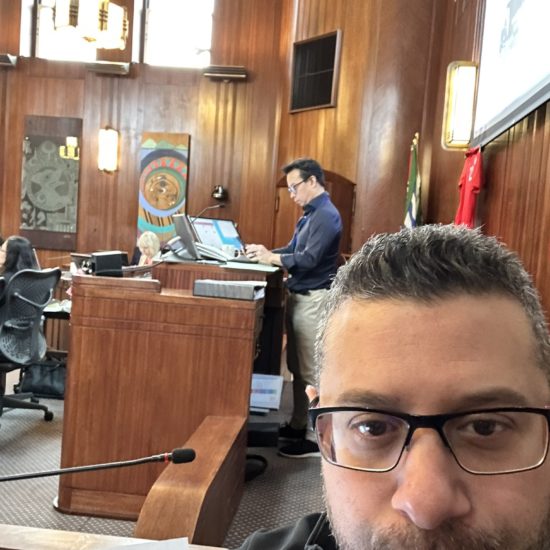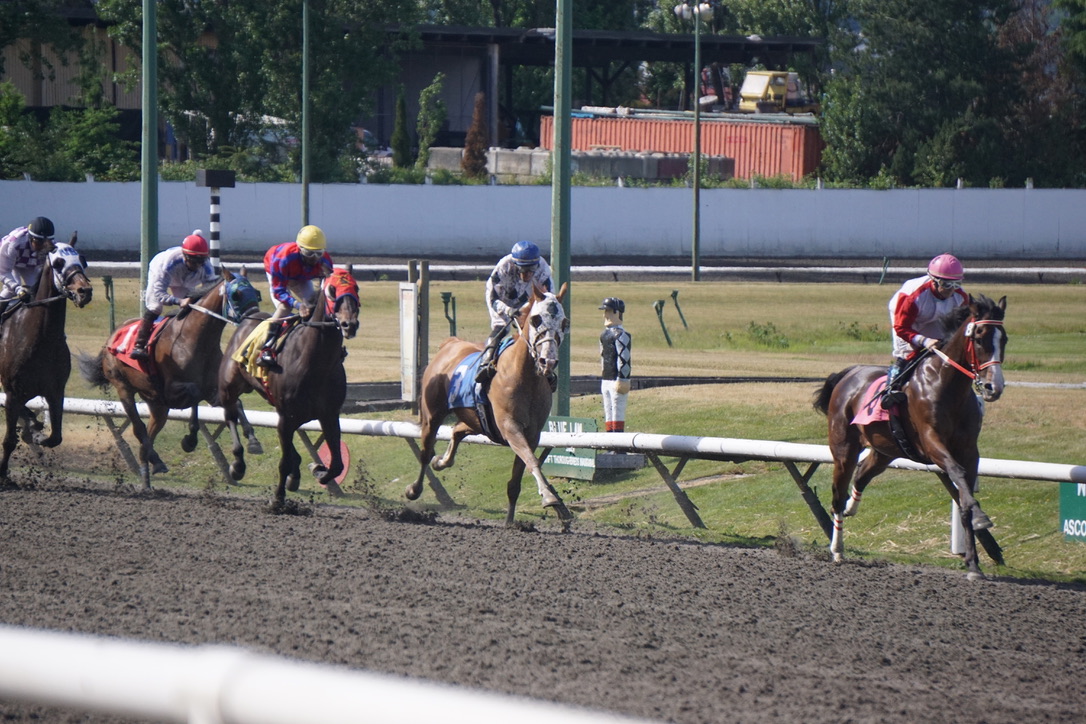
Bob Mackin
Attorney General David Eby said Aug. 27 that he is concerned a corrupt B.C. government employee exploited Mexicans at Hastings Racecourse who are facing deportation after working illegally in the barns.
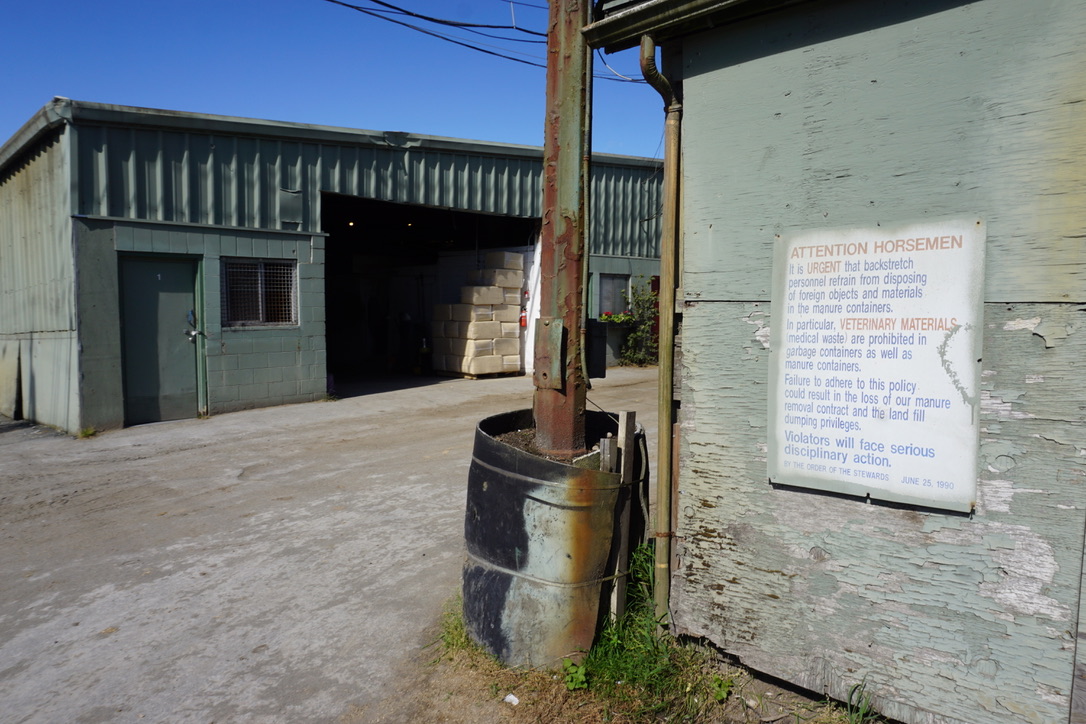
Hastings Racecourse backstretch, June 2018 (Mackin)
“For a lot of us when we think about people coming from countries where there are not a lot of opportunities, people are living in poverty, they’re coming to Canada and looking for a way to support families at home, they are extremely vulnerable,” Eby told reporters.
More than two dozen were arrested in a Canada Border Services Agency-led dawn raid at the Hastings Racecourse stables on Aug. 19. Seven were eventually sent to the Immigration and Refugee Board for hearings. Documents released by the IRB show that one came to Canada for boxing and wound-up at the East Vancouver track, despite no prior horse-minding experience. Another was a machinery design manager looking to make better money. Most of them lived in dorms at the stables.
All seven were paid low by Canadian standards to clean and feed horses. Several reported that they paid a crooked official from the Gaming Policy and Enforcement Branch in a scheme to hide the fact they were not legally allowed to work in Canada. That worker, Eby said, is suspended with pay, pending the investigation. Eby said he was concerned with corruption at Hastings while in opposition; BC Liberal minister Mike de Jong didn’t act on his concerns. The current investigation stems from a whistleblower who contacted Eby last fall.
According to CBSA documents examined by theBreaker.news, only one of the seven had a serious prior run-in with the law.
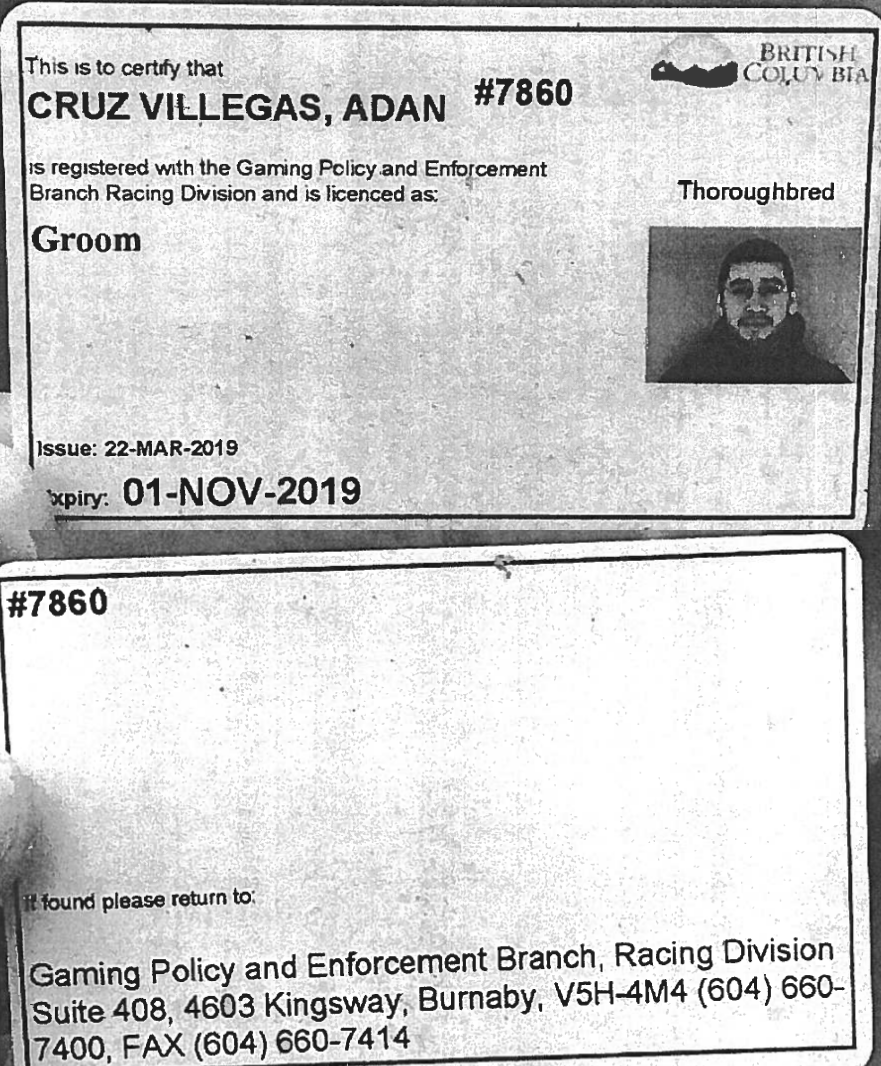
The Gaming Policy and Enforcement Branch licence for Adan Cruz Villegas (GPEB/IRB)
Adan Cruz Villegas, 27, arrived at Vancouver International Airport on Feb. 13 and applied for a GPEB licence as an owner on March 10 — even though he would work in the stables on horses owned by others. Villegas sought to extend his stay in Canada on July 23. He was paid $500 to $700 cash every two weeks, but claimed to not know his employer.
In his interview with a CBSA officer, Villegas admitted to spending approximately three months in a Mexican jail after a robbery arrest. He claimed to have been released with no charge. The CBSA officer asked him about visible tattoos — three small dots on his left hand and a crown behind his right ear. He denied gang significance and stated he had never been affiliated with a gang. The customs officer’s report said the three small dots mean “mi vida loca” [my crazy life] and the five-point crown is often associated with the Almighty Latin Kings Nation gang.
Oscar David Tapia Fernandez, 33, did have a valid work permit under trainer Craig McPherson through the end of the year. But to be a jockey, not a groom. He admitted he had come to Canada since 2013 under the guise of being a jockey in order to obtain a work permit and had been a jockey in Mexico, but “now I am too big,” Tapia said.
Jose De Jesus Gonzalez Vazquez, 25, and Oscar Miguel Navarro Caravantes, 34, both worked for trainer Phil Hall. Caravantes said he was paid by cheque every 15 days at a rate of $80 per day. He worked six-to-seven hours a day, six-to-seven days a week and shared an apartment in the West End with friends, including another undocumented worker. Caravantes had entered Canada in March, declaring he would stay 20 days as a visitor. Vasquez was also paid by cheque every two weeks, at a rate of $75 a day, for working five hours a day, seven days a week at Hastings.
Back home in Mexico, Vazquez was a machinery designer in charge of production workers.
“I was thinking about going back to Mexico to my job, but when I saw the opportunity here to make more money than in Mexico,” said Vazquez, who came north in April, in a CBSA interview transcript. “I make good money in my job but not like here.”

Hastings Racecourse backstretch, June 2018 (Mackin)
Juan Daniel Bedolla Orozco, 26, also known as “El Tornado,” entered in April in Montreal and had plans to box in Montreal and Edmonton. He got a job as a groomer at Hastings for $80 a day, six days a week.
“When asked why he wanted to stay in Canada, subject stated that he really likes it here and decided to stay, despite having a good job and wife in Mexico,” said the CBSA report.
Brandon Daniel Carrion Gomez, 25, came in June and had been working as a groom for trainer Pat Jarvis, for $70-a-day, five days a week. He had paid $1,000 for his GPEB licence to the person who took his photograph, the testimony said. Gomez said a friend in Mexico, named Moises, offered him the job.
Another Jarvis employee, Javier Olalde Angel, was celebrating his 58th birthday on the day of the raid. He had been coming to Canada since 2007 as a groom. His latest stint began after he arrived in April with an invitation letter from his son’s Port Coquitlam fiancé. Angel was paid $1,100 every two weeks in cash after paying $600 for this GPEB identification card that bore the name of his son, a permanent resident of Canada.
The scheme was described by one of the agents, inland enforcement officer Danielle Jensen. In her notes, she wrote that GPEB identified nine registrations in which the GPEB inspector had subbed photographs on registration cards so that the person whose face appears on the registration card is not registered with GPEB at all.
She found that a trainer at the race track paid $1,500 for two Mexicans to be registered by GPEB and that they suspect the GPEB inspector was receiving remuneration for the fraud.
“Through their investigation, GPEB identified an inspector at Hastings Racecourse who they believe is engaging in fraud,” Jensen wrote. “Specifically, foreign workers are presenting themselves to this GPEB inspector as horse owners [which exempts them from work permit requirements] on their applications for registration.”
“The GPEB inspector submits their application for registration via GOS [gaming online system] and they are being approved as owners. Upon receipt of approval, the GPEB inspector prints them a registration card that lists the foreign worker’s job title as an owner. On a subsequent day, that same GPEB inspector is going back into GOS and changing the foreign worker’s job title from owner to the job title that actually reflects the work they are going to be doing at the racetrack, such as groom, which is a job that requires a work permit.”
David Milburn, president of the Horsemen’s Benevolent and Protective Association of B.C., said not all trainers employ foreign workers and some would have been employing foreign workers for the first time.
theBreaker.news asked Milburn whether the trainers should have done due diligence to determine whether the Mexicans were permitted to work in Canada, rather than deferring to GPEB. He said the application for a gaming worker licence is a private matter between any potential employee and GPEB.
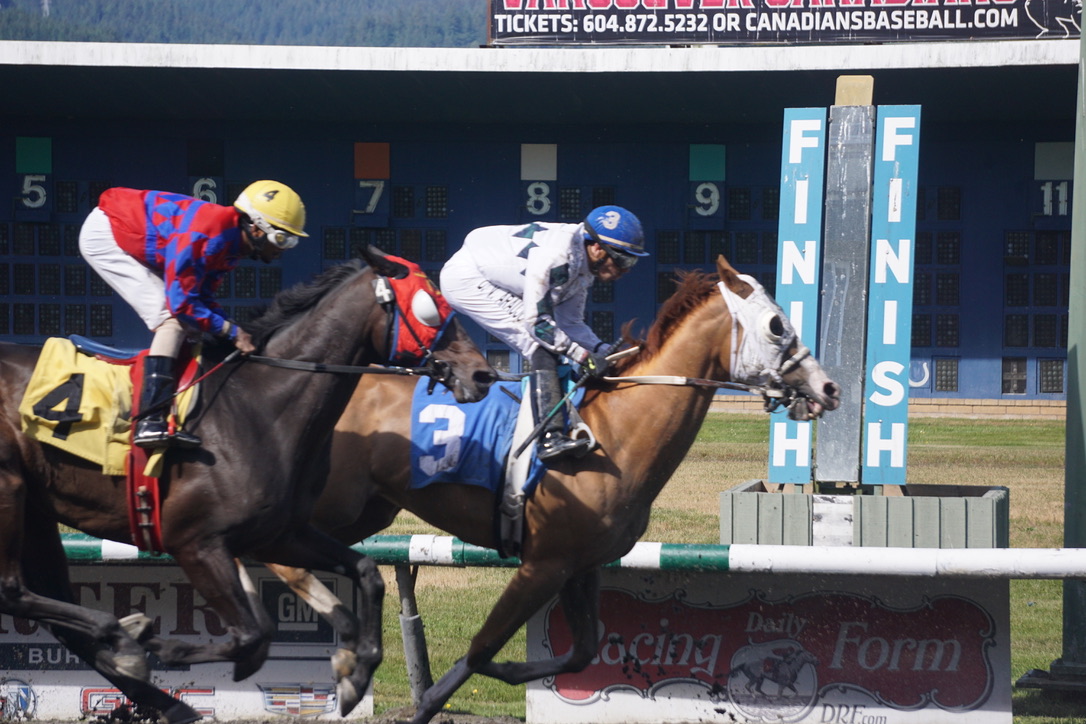
Hastings Racecourse, June 2018 (Mackin)
“We rely on the regulator and the regulator has a job to do and the regulator determines solely who should and shouldn’t be licensed,” Milburn said. “Going forward we’ll respond as we learn more about this. We don’t have all the facts right now.”
In a chapter from his second report about money laundering in B.C., Peter German acknowledged the sport of kings has attracted an eclectic audience and unsavoury criminal element at Hastings — from petty criminals who find menial work to corrupt race course employees and officials to criminals engaged in sophisticated money making schemes. Hastings is city-owned and also includes a casino, but it is leased to Great Canadian Gaming Corp. The trainers are not Great Canadian employees.
In 2017, the GPEB Racing Unit registered 679 horse racing workers and made 104 rulings, including infractions committed during a race (50), inappropriate behaviour in the back stretch (20) and drug or alcohol violations involving a horse or worker (14). German’s report described the 2002 murder of a Hastings horse trainer and his girlfriend, whose bodies were found in the trunk of a car. Five years later, a former jockey’s agent was convicted of two counts of first degree murder related to a drug operation.
Over the last decade, German’s report said, Vancouver Police Department investigated 61 incidents, including three fraud complaints, “in which suspects presented fake identification, or identification in another person’s name.”
Support theBreaker.news for as low as $2 a month on Patreon. Find out how. Click here.






